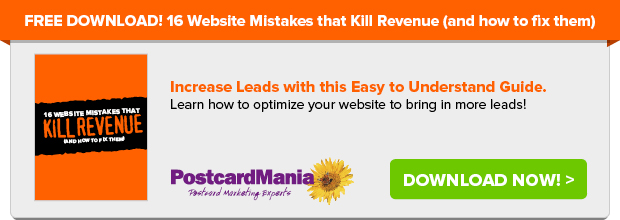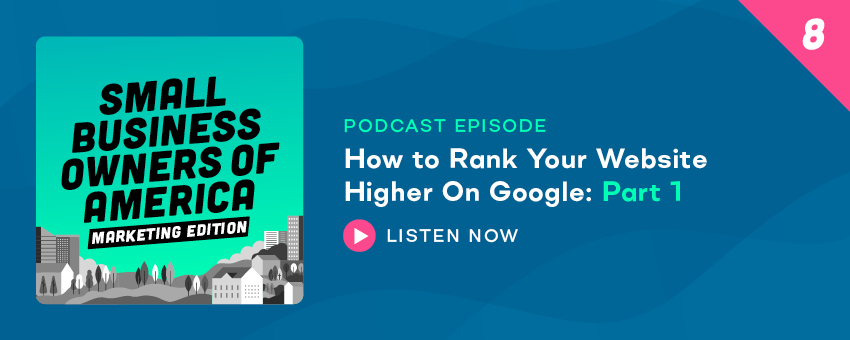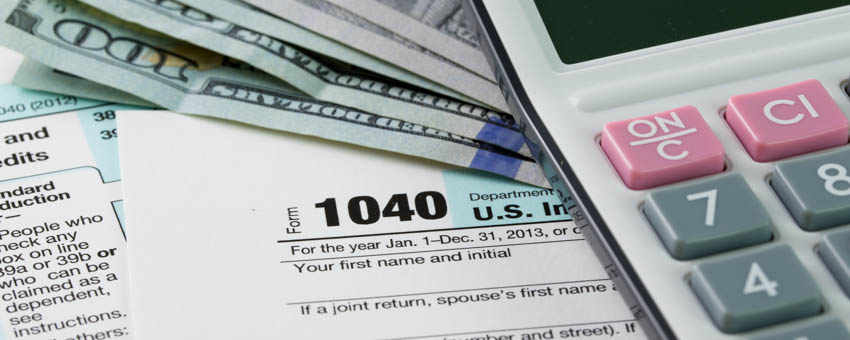How to Rank Your Website Higher On Google: Part 1
Updated on January 21, 2022In this week’s podcast episode, our Director of SEO, Jacquelyn, helps demystify the puzzle that is Search Engine Optimization (SEO). If you aren’t familiar, it’s how to get your website on the first page of Google so prospects looking for a local business can find it – which is SUPER important.
Hear her easy-to-understand breakdown of SEO here…
You can also listen to this podcast on Buzzsprout, Spotify, and Apple Podcasts! Subscribe to get notifications for future episodes!
Here’s the transcription below of today’s episode, a conversation between our Director of Multimedia Content, Peyton, and Johnny, PostcardMania’s Online Product Delivery Manager:
Note: This transcription has been edited slightly for clarity.
Peyton: Welcome back to Small Business Owners of America-Marketing Edition. My name is Peyton, your host, and I’m so happy to talk to you guys today about Search Engine Optimization, or SEO for short.
Okay, do not stop listening to this because I just threw big words at you. We’re going to break it down. Let’s say you type in Google Search “attorney near me.” Scrolling past the websites that have the word ad next to it, because we already talked about Google Ads, you are most likely going to click on the websites that are towards the top of the page, right? I couldn’t be bothered scrolling to the second or even the third page, let’s be honest, I only look at the first page results.
According to Moz, the first page of Google capture 71% of search traffic clicks and has been reported to be as high as 92% in recent years. But how do these businesses have their website on that first page? Well, Search Engine Optimization has a lot to do with why some pages are on the first page and others aren’t.
To help us understand Search Engine Optimization (SEO) and how it can help small businesses, I’m sitting here with Jacquelyn, the Director of SEO at PostcardMania. She joined PostcardMania almost two years ago to help them launch SEO as a service. It was the last piece of their digital marketing offers puzzle. PostcardMania had website building, display ads, and Google ads, we just needed SEO. As the director of SEO, Jacquelyn and her team work closely with clients to help them rank higher in search engines. She makes sure client’s sites are visible anywhere potential customers might be searching for them. Hi, Jacquelyn.
Jacquelyn: Hi, Peyton.
Peyton: We know what SEO stands for because I’ve said it a few times. But how does it work?
Jacquelyn: So loaded question off the bat.
Peyton: Yes, I know.
Jacquelyn: So to understand how SEO works, I want to explain how search engines work. I’m not going to get too technical, but I think that it’s really important to understand that first before going into all the aspects we can do to kind of help a website rank higher. So search engines are obviously very complicated, and we’ll never actually know how they work. I mean, it’s Google’s trade secret, it’s not like Coca-Cola is giving us a formula for all their beverages, right?
Peyton: Right.
Jacquelyn: So Google is of course very secretive and protective of its thousands of algorithms –yes, thousands – it’s not just one algorithm controlling Search Engines. So there are three main parts to how a Search Engine works. First, they have crawlers that crawl the web, sometimes these are referred to as bots or spiders, and so Search Engines send out all these little spiders to crawl the internet. So that’s the first step.
The second step is called indexing. So it’s kind of just a fancy way to say, “This is Google’s library of websites and web pages.” Right, so Google will crawl a website, and then, when it crawls a site, it has to determine what the page is about, what the website is about, to see if it wants to index that page. Just because you have a website doesn’t mean you’re going to be included in Google’s index.
Peyton: Oh my gosh.
Jacquelyn: Yeah. It could just say no. They don’t want to index your website. So how do you make sure Google wants to index your website? You have to have a great website with great content that offers something to your customers, so it can’t just be any old website with one word on a page that makes zero sense, Google doesn’t want that.
So once Google has chosen to index your website, it could still be on page 100 of the search results. It doesn’t mean that you’re going to rank high just because you’re indexed.
So the third step, and obviously one of the most important is ranking. So once Google has crawled your site, indexed your site, it has to figure out where it falls in terms of the billions and billions of other web pages on the internet. So when someone types in a specific keyword, are you relevant for that?
So that’s the most important part, is the ranking to try and determine where you fall with competitors, so now that we have an idea of how search engines work, how do we help our website in that entire process? And there are things that SEOs can do to help your website perform the best in each area of that, in the crawling, in the indexing, and in the ranking. So first off, you know that it’s important to be indexed in Search Engine results, right?
Peyton: Yes, yes.
Jacquelyn: But there’s certain things, certain technical things in the back end of your website that can actually block search engines from even seeing it. Yeah.
Peyton: Oh really? What?
Jacquelyn: We’ve had clients before, I won’t name any names, but they’ve blocked their entire websites from Google without even knowing it. Yeah.
Peyton: Oh, that would be terrible, terrifying.
Jacquelyn: Yeah, so they come to us saying, “Please help, we need your help, nobody can see our website.” I spend about five seconds on the website and I can see in the code they have no index in their entire website, meaning they have blocked Google’s crawlers from even seeing it.
Peyton: Oh, man.
Jacquelyn: So if Google lands there, they see that code, they go, “Alright, moving on.”
Peyton: Oh, my goodness.
Jacquelyn: Yeah.
Peyton: It’s like that site is invisible. So Google doesn’t recognize it.
Jacquelyn: Exactly, yeah. So there are a lot of technical aspects that happen even before ranking, even before you try and get on that first page that need to be intact.
Peyton: Okay.
Jacquelyn: And another super important aspect of how Search Engine Optimization works is something called on-page optimization, and that refers to obviously everything you can see on a web page. So this refers to what’s the headline on the page, what’s the text say on the page, are there any links on the page pointing to other pages on your website? Basically everything a user can see is important to make sure that those are fully optimized to help the user understand your website and also to help a Search Engine topically understand what the page is about.
Jacquelyn: Another aspect for how SEO works is applicable mostly to local businesses, and that’s referred to as Local SEO. So if you’re a national chain that doesn’t even have a retail location, or your target market is the entire country, this won’t necessarily apply to you. But if you’re a local business, with one location, or 10, or 20 locations, this is super important for you to understand.
So first off, you need to make sure you have a Google business profile for each location that you have, and we talked about some recent changes to Google business profile in a recent episode, so you can go ahead and listen to that.
Peyton: Please, listen. Thanks.
Jacquelyn: And so what a Google business profile does is it powers local search results, so any time you search for “Restaurant near me” or “Best cheeseburger near me” “Pizza near me”. Can you tell I’m hungry?
Peyton: Mm-hmm.
Jacquelyn: You see the Map Pack of search results that pop up, and these are powered by your Google business profile, so if you don’t have one, people aren’t even going to see you there. And that’s where everyone goes to search for things. If you pull up the Google Maps app on your cell phone, that’s all from a Google My Business profile.
Peyton: I do that all the time when I’m looking for restaurants, like best restaurants in Tampa or Clearwater area, I definitely do that and everything pops up; the reviews pop up, where it’s located, super important, if you’re a small business, if you were to listen to anything, listen to that, set up your Google business profile, y’all.
Jacquelyn: Exactly. And make sure it’s optimized. Maybe someone set one up for your business five plus years ago, it’s an old phone number, it’s an old address, so if customers are actually trying to contact you from there and it’s old information, they might not even reach you or they’ll just get frustrated and choose one of your competitors.
Peyton: Yeah. Now, do I really need SEO?
Jacquelyn: If you want people to find you online, which you probably do, you definitely need SEO. I don’t know what businesses in today’s climate don’t care about people finding them online or don’t have a website or something. So yes, if you have a website and you want customers to go there for any reason, you don’t have to be an e-commerce business. You don’t need to be selling something online, you could be a local dentist who wants people to find new patients online. They’re going to Google “Dentists near me” and they’re going to search through the search results.
Peyton: So we were talking ranking and that first page results, when you’re searching something on Google, how do I get my website to rank at the top of Google?
Jacquelyn: How much time do we have again? We can talk about this for a long time.
Peyton: I guess. In the broadest sense.
Jacquelyn: Right. Talking in a general sense, we covered some of those on-page optimization elements, and when you’re working on on-page optimization, you want to start with a general keyword or topic. So try and get in the mind of your consumer, just like any basic marketing tactic you’re going to focus on what would someone search for to find this page?
Peyton: Website page, right?
Jacquelyn: The website page, correct. Yeah, so if you’re a family dentist and we’re talking about the services page on your website, they’d probably search, family dentistry near me, family dentistry in Clearwater, Florida, whatever city you’re located in. So you want that to be in the main headline on the page. Or you want to mention family dentistry in Clearwater, Florida, or your Clearwater family dentist. Something like that.
Peyton: Okay. So you have to get into the mind of the consumer and then on your website, use those same words that they might search in Google.
Jacquelyn: Exactly. And that’s how users and Google will understand what that page is about. If you don’t mention that keyword, Google will look through the page and be like, “Well, I’m not actually sure what they’re going for here, or what topic this is most relevant for, so I don’t know what keywords to rank it for. I’m just going to move on to the next page or to the next website.”
Peyton: And here’s a question, website-related, does it matter how much content you have on your website? Like say, if I use all of those search words on one single page on my website, one or two pages, is that going to affect my ranking?
Jacquelyn: Yeah, it definitely would. So the best rule of thumb when it comes to judging how much content you should have on your website is if you want to rank for a specific keyword or topic, you should have a page on your website for that topic, so you don’t want to jam everything onto one page, because that’s going to be too complicated for Google to understand and think about if you went to a website that put every single thing onto one page, you’re going to be confused too.
Peyton: It’s going to be a lot of scrolling.
Jacquelyn: Yeah, you’re not going to have a good user experience, is how we would refer to that, so. The experience of a user when they come to your website is another really important aspect of SEO that I think can sometimes be overlooked.
So keywords are important, this optimization is important. But the whole goal of all of this is for the user to have a good experience on your website. Because Google and other search engines look at things like how long a user spends on your website, did they click on your website from search results, and then immediately bounce off because they didn’t like the content or they didn’t like the way the website looked or it loaded too slow? How many pages did they view on your website, so maybe they were really engaged with your content, you have a great blog that you built out, and they’re clicking through all the blog posts? Hopefully, they convert. Hopefully, they call you, fill out your contact form. Those are all great signals that search engines love to see, and you could be rewarded for that in search engine results.
Peyton: So, what you’re telling me is, websites and search engine optimization are best friends?
Jacquelyn: Yeah, they are. And another thing I want to mention, going back to how many pages should you have on your website, much content do you need? I always recommend having one page for each service you offer. So I know we keep going back to dentist, but it’s an easier example to go through. So if you’re a dentist, do you want to have a page for teeth whitening, you want to have a page for cosmetic dentistry, you want to have a page for porcelain veneers or any other service under that cosmetic dentistry topic. So that’s always important because those are going to be relevant for that keyword. And in addition to a page for each service, if you target multiple locations, you want a page for each location.
Peyton: Right.
Jacquelyn: So, if we’re talking about our area, you’d want a page for Clearwater, Tampa, St. Pete. Any area you target, you should have a location page for that has content unique to that area.
0:13:13.5 Peyton: Definitely. If you have multiple locations, you don’t want people to think that you only care about one location or you don’t want to send everybody to that one location. You want to have every single location taken care of, have a page up for its own.
Jacquelyn: Exactly. And you don’t even have to have a physical address there. If you do have physical addresses in other locations, those definitely need a page. But yeah, any city you’re targeting like that that’s nearby, you need a page for.
Peyton: Hey guys, its Peyton here. Don’t worry, you still have plenty to learn about SEO. But for the sake of time, I’m going to split this episode into two parts. So what I’m going to have you do is maybe go take a break, maybe get some water, a little snack, and come back, ready to learn more about SEO with Jacquelyn and I in part two of this episode.






